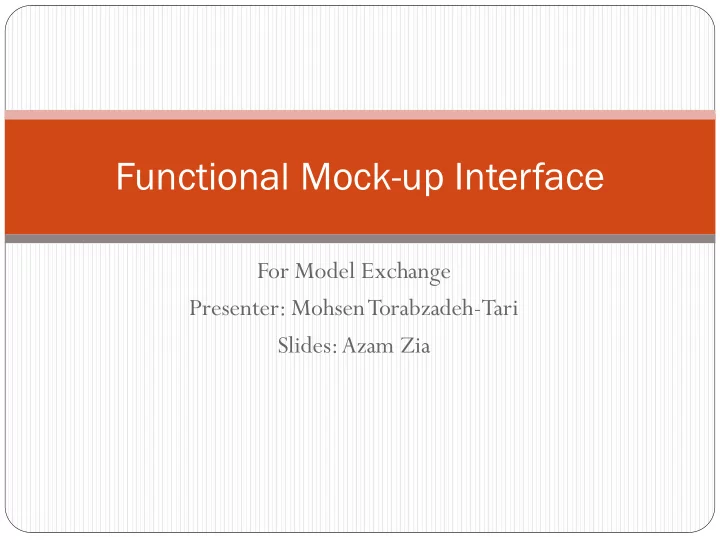

Functional Mock-up Interface For Model Exchange Presenter: Mohsen Torabzadeh-Tari Slides: Azam Zia
Functional Mock-up Interface Purpose: To describe models and provide an interface to evaluate them as needed in different simulation environments. Defines an interface for an executable called FMU (Functional Mock-up Unit). FMI functions are called by a simulator to create instances of the FMU, called models. An FMU may either be self-integrating (co-simulation) or require the simulator to perform numerical integration.
Parts of FMU A model is distributed in one zip-file that contains several files: XML file which contains the definition of all variables in the model and other model information. C file which has all needed model equations with a small set of easy to use C-functions. These C-functions can either be provided in source and/or binary form. Further data like a model icon, documentation files and maps needed by the model. All object libraries or DLLs that are utilized.
OMC System Design
Susan Template Language We have implemented FMU module in Susan Template language. A Susan compiler translates source code in the Susan language into the MetaModelica language. template DefineVariables(SimVar simVar, Integer x) "Generates code for defining variables in c file for FMU target. " ::= match simVar case SIMVAR(__) then let description = if comment then '// "<%comment%>"' << #define <%crefStr(name)%>_ <%prefix%>; <%description%> >> end DefineVariables;
MetaModelica Code Generated MetaModelica Code for susan function. public function DefineVariables input Tpl.Text in_txt; input SimCode.SimVar in_a_simVar; input String in_a_prefix; output Tpl.Text out_txt; algorithm out_txt := matchcontinue (in_txt, in_a_simVar, in_a_prefix) local ... case (txt, SimCode.SIMVAR(comment = i_comment, name = i_name), a_prefix ) equation txt = Tpl.writeTok(txt, Tpl.ST_STRING("#define ")); ... then txt; case ( txt, _, _ ) then txt; end matchcontinue; end DefineVariables;
XML Data File <?xml version="1.0" encoding="UTF-8"?> <fmiModelDescription fmiVersion="1.0" modelName="BouncingBall" modelIdentifier="BouncingBall" guid="{36dcdcac-cb78-431e-8f91-dd0f993b24cf}" generationTool="OpenModelica Compiler 1.6.0" generationDateAndTime="2011-2-1T15:3:11Z" variableNamingConvention="structured" numberOfContinuousStates="2" numberOfEventIndicators="2"> <ModelVariables> <ScalarVariable name="h“ valueReference="10“ description="height of ball“ variability="continuous“ causality="internal“ alias="noAlias"> <Real start="1.0" fixed="true" /> </ScalarVariable> ... </ModelVariables> </fmiModelDescription>
FMI Import Functions fmiModelTypes.h contains basic type definitions e.g: fmiInteger; typedef int These header files must be utilized when compiling a model. In order to have unique function names, every "real" function name is constructed by prepending the function name by "MODEL_ID" + "_" where "MODEL_ID" is the short name of the model. fmiModelFunctions.h defines all functions for model execution interface e.g DllExport fmiStatus fmiGetDerivatives(fmiComponent c, fmiReal derivatives[], size_t nx); DllExport fmiStatus fmiTerminate (fmiComponent c);
C Code Some code for import interface functions is implemented in C language: fmiStatus fmiSetReal(fmiComponent c, ... ){ int i; ModelInstance* mi = (ModelInstance *)c; if (validateState(mi, modelInstantiated)) return fmiError; ... for (i=0; i<totalReals; i++) { if (varOutOfRange(mi, TOTAL_REALS)) return fmiError; comp->r[vr[i]] = value[i]; } return fmiOK; }
Whats Done XML Data export. C FMI interface functions. C export for variable definitions. C export for functions like model initialization, real variable etc. FMU Makefile API for FMI translation translateModelFMU(ModelName)
Problems Faced Understanding existing code for OMC Reuse of existing functions Learning Template Language
Whats Left Getting event indicators/zero crossings. (10 days) Event update function.(5 Days) Getting time events.(10 Days) Testing exported FMUs.(5 Days / Until fixed)
Thanks
Recommend
More recommend